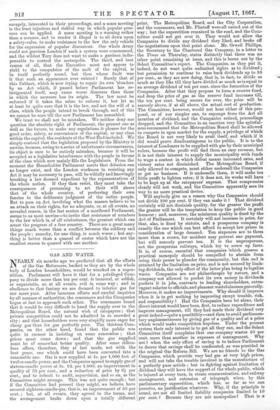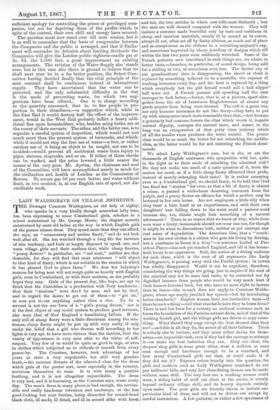GAS AND WATER. N EARLY six months ago we predicted that
all the efforts of the Gas Reformers, backed as they are by the whole body of London householders, would be wrecked on a super- stition. Parliament will have it that for a privileged Com- pany to divide more than ten per cent. is immoral, or selfish, or unpatriotic, or, at all events, evil in some way ; and in obedience to that fantasy we are doomed to inferior gas for one more year. After immense efforts and careful inquiries by all manner of authorities, the consumers and the Companies began at last to approach each other. The consumers found that it would be very difficult to hand the supply over to the Metropolitan Board, the natural wish of ratepayers ; that private competition could not be admitted in so crowded a city ; and that householders were very stupidly more eager for cheap gas than for gas perfectly pure. The thirteen Com- panies, on the other hand, found that the public was quite in earnest in insisting on some concession ; that prices must come down ; and that the gas supplied must be of somewhat better quality. After some ridicu- lous offers, therefore, they at last made, not with the best grace, one which could have been converted into a reasonable one. Gas is now supplied at 4s. per 1,000 feet of twelve-candle power, and the Companies agreed to supply gas of sixteen-candle power at 3s. 9d. per 1,000, an improvement in quality of 33 per cent., and a reduction of price by 6f per cent., and to submit to audit, supervision, and so on, as the Committee might arrange. This was not quite enough ; but if the Committee had pressed they might, we believe, have secured eighteen-candle-gas, that is, an improvement of 50 per cent. ; but, at all events, they agreed to the terms, and the arrangement broke down upon a totally different point. The Metropolitan Board, and the City Corporation, and the consumers, and Mr. Flintoff were all carted out of the way ; but the superstition remained in the road, and the Com- mittee could not get over it. They would not allow the Companies to divide any dividend they liked, and broke off the negotiations upon that point alone. Mr. Orwell Phillips, the Secretary to the Chartered Gas Company, in a letter to the Times on Thursday, states distinctly that there was no other point remaining at issue, and this is borne out by the Select Committee's report. The Companies, as they put it, indeed, do not want quite unlimited rights as to dividend ; but permission to continue to raise back dividends up to 10 per cent., as they are now doing, that is, in fact, to divide as much as they like till they have divided as much as is equal to an average dividend of ten per cent. since the formation of the Companies. After that they propose to form a reserve fund, and drop the price of gas as the reserve fund increases till, the ten per cent. being secure for ever, the price will be scarcely above, if at all above, the actual cost of production. The Committee, however, would not hear either of this pro- posal, or of our simpler one, to expunge from the Act all mention of dividend, and the Companies retired, proceedings dropped, and the Committee in an emotion very like spiteful- ness recommend that the Metropolitan Board shall be allowed to compete in open market for the supply, a privilege of which the Board is not very likely to avail itself, and which if it did would prove disadvantageous to the public. It is to the interest of Londoners to be supplied with gas by their municipal rulers, because the profit will find them an easy revenue, but it is not their interest to supply the municipality with funds to wage a contest in which defeat means increased rates, and victory rates not diminished. The Metropolitan Board, if only allowed to compete, must either undersell the Companies or get no business. If it undersells them, it will make too little profit to lighten rates; if it does not, its works will have to be kept up at the ratepayers' expense. That compromise clearly will not work, and the Committee apparently sees its way to no more practical device.
Will anybody give us a reason why Gas Companies should not divide 100 per cent. if they can make it ? That dividend certainly will not diminish quality, for the greater the profit the greater will be the temptation to keep the public in good humour • and, moreover, the minimum quality is fixed by the Act of Parliament. It certainly will not increase in price, for that, also, is fixed by statute, and a prosperous company is exactly the one which can best afford to accept low prices in consideration of large demand. Ten sixpences are to them more than a crown, for accident may prevent one payment, but will scarcely prevent ten. It is the unprosperous, not the prosperous railways, which try to screw up fares. It is, of course, essential that companies -which possess a practical monopoly should be compelled to abstain from using their power to plunder the community, but this end is attained by the limitation on price, and is not secured by limit- ing dividends, the only effect of the latter plan being to legalize waste. Companies are not philanthropic by nature, and a company not allowed to pocket its own money in dividends pockets it in jobs, contracts to leading shareholders, extra- vagant salaries to officials, and pleasant wastefulnesses generally. Moreover, it makes no improvements. Why should it improve when it is to get nothing by improving except trouble, risk, and responsibility ? Had the Companies been let alone, their direct interest would have been, first, to reduce expenditure and improve management, till they had made their dividend very great indeed—quite a possibility—and then to avoid parliamen- tary unpleasantnesses by giving gas of a quality and at a price which would make competition hopeless. Under the present system their only interest is to get all they can, and the Select Committee itself complains that one company wastes 50 per cent, more than another in expenses of management. Why not? when the only effect of saving is to induce Parliament to decree that savings shall be confiscated, as was provided in the original Gas Reform Bill. We are no friends to the Gas Companies, which provide very bad gas at very high prices, and will not take the trouble involved in the manufacture of a perfectly pure article ; but in fighting against limitation of dividend they will have the support of the whole public, which is injured at every turn, in steam communication, and railway management, and extension of telegraph wires, by this parliamentary superstition, which has, so far as we can perceive, no justification whatever. Why, if the principle is sound, are not all limited liability companies limited to 10 per cent. Because they are not monopolies ? That is a
sufficient apology for controlling the prices of privileged com- panies, but not for depriving them of the profits which, in spite of the control, their own skill and energy have secured.
The question must now stand over till next session, but it is as well to remember that the basis of compromise between the Companies and the public is arranged, and that if Parlia- ment will surrender its delusion about limiting dividends the Companies will give the London public eighteen-candle gas at 3s. 9d. the 1,000 feet. a great improvement on existing arrangements. The revision of the Water Supply also- stands over, but in this case also there is ground to believe that we shall next year be in a far better position, the Select Com- mittee having decided finally that the vital principle of the next contract shall be continuous instead of intermittent supply. They have ascertained that the water can be
• procured, and the only substantial difficulty in the way is the mode of preventing• waste, for which two sug- gestions have been offered,. One is to charge according to the quantity consumed, that is, to fine people in pro- -portion to their cleanliness,—a suggestion which, while in the East End it would destroy half the effect of the improve- ment, would in the West End probably inflict a heavy addi- tional fine upon householders, who, besides using baths, are at the mercy of their servants. The other, and the better one, is to organize a careful system of inspection, which would not cost much more than the present system of turncocks, and which, while it would not stop the free use of water—a free, or rather careless use of it being an object to be sought, not one to be avoided—would prevent all accidental waste from injury to pipes, cisterns, stopcocks, and so on. If either of these checks can be worked, and the price lowered a little nearer the means of the very poor, Mr. Ayrton, the chairman and soul of the Committee, will have accomplished nearly as much for the civilization and health of London as the Commission of Sewers. To secure gas 50 per cent, better, and water without • limit, in two sessions, is, at our English rate of speed, not dis- creditable work.































 Previous page
Previous page